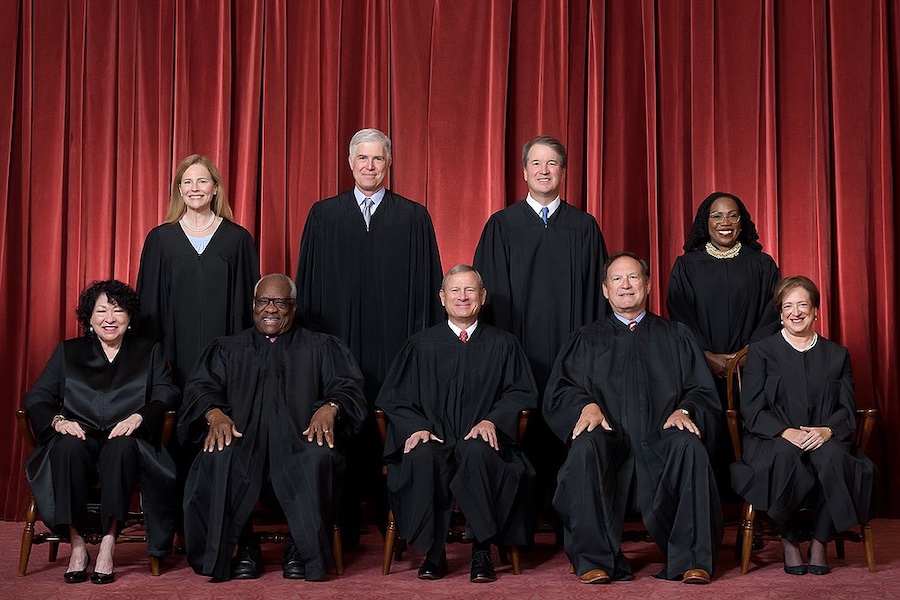On Monday, the U.S. Supreme Court rejected a challenge to a ban on so-called assault weapons in Maryland, upholding a ruling from a lower court. Conservatives across the country were left reeling by news of the decision.
By opting not to review the ruling from the U.S. Court of Appeals for the 4th Circuit, the highest court in the nation dodges a serious battle concerning gun rights. They avoid having to weigh in on whether the Second Amendment allows individual states to regulate rifles, such as the AR-15.
Three Justices, Clarence Thomas, Samuel Alito, and Neil Gorsuch, all disagreed with the court’s decision to turn the case away.
SCOTUS’s rejection of the case isn’t the first. They turned away a legal battle over the same law last year due to a federal appeals court not ruling on it. However, the 4th Circuit backed the measure in August 2024.
The court said weapons such as the AR-15 could be banned because, at least in part, they fall outside the scope of the Second Amendment.
“But the question of whether AR-15s are protected by the Second Amendment is likely to be soon decided by the Supreme Court. In a separate statement, Justice Brett Kavanaugh said that the issue is currently being considered by other federal appeals courts, and rulings from them ‘should assist this court’s ultimate decisionmaking.’ He predicted appeals to the Supreme Court will be before the court ‘shortly,’ and said the justices ‘should and presumably will address the AR-15 issue soon, in the next term or two,’” CBS News reported.
Along with rejecting the appeal on Maryland’s ban, SCOTUS also decided against hearing a challenge to the ban on large-capacity magazines in Rhode Island, allowing the law to remain in effect.
These are only two out of many cases to come before the Supreme Court after it expanded the right to bear arms in summer 2022, creating a new framework for deciding if restrictions on firearms are in line with the Constitution.
CBS notes that under the new standard, the government must show that a measure being considered is consistent with America’s historical tradition of firearms regulation and is allowed under the Second Amendment.
However, a number of courts have struggled to apply the framework, which has led to conflicting decisions concerning the constitutionality of certain longstanding gun laws.
Maryland’s ban on specific semiautomatic rifles was first put into effect following the tragic 2012 shooting at Sandy Hook Elementary School in Connecticut. Under the current law, it’s a crime to be in possession of, sell, or transfer, or purchase a so-called “assault long gun” or a “copycat weapon.”
The list of these “copycat weapons” includes 45 specific types of guns. However, there is a variety of semiautomatic handguns and rifles that are still allowed to be purchased, according to information from the Maryland State Police.
A group of residents in Maryland wanted to buy rifles that were restricted under the ban, so a licensed gun dealer and several gun rights groups challenged the law five years ago, making the case that the Second Amendment allows citizens to own common “assault rifles.”
The federal district court and the U.S. Court of Appeals for the 4th Circuit backed the law.
Challengers of the Maryland measure asked SCOTUS to take a look at the decision. They opted to put consideration on hold while they worked on another gun case concerning concealed carry rules in New York. After that ruling, they sent the challenge to the Maryland law back to the appeals court for them to reconsider the case.
They decided, after applying the new framework, that the ban is constitutional. The court found that rifles like the AR-15 are most useful in military service and thus banning them is in line with the Second Amendment.
Justice Brett Kavanaugh called the court’s decision “questionable.”
“Given that millions of Americans own AR-15s and that a significant majority of the states allow possession of those rifles, petitioners have a strong argument that AR-15s are in ‘common use’ by law-abiding citizens and therefore are protected by the Second Amendment,” he said in his opinion. “If so, then the Fourth Circuit would have erred by holding that Maryland’s ban on AR–15s complies with the Second Amendment.”
In a solo dissent, Thomas stated that SCOTUS shouldn’t wait any longer to decide whether laws banning AR-15s are constitutional, noting justices have ignored the issue for a decade.
“[F]urther percolation is of little value when lower courts in the jurisdictions that ban AR-15s appear bent on distorting this court’s Second Amendment precedents,” he said. “I doubt we would sit idly by if lower courts were to so subvert our precedents involving any other constitutional right. Until we are vigilant in enforcing it, the right to bear arms will remain ‘a second-class right.’”

